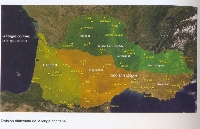The language: Occitan

“Tan m’abellis vostre cortes deman,
qu’ieu no me puesc ni voill a vos cobrire. Ieu siu Arnaut que plor e vau cantan;
consiros vei la passada folor,
e vei jausen lo joi qu’esper, denan.
Ara vos prec, per aquella valor
que vos guida al som de l’escalina,
sovenha vos a temps de ma dolor!”
Your courteous question pleases me so,
that I cannot and will not hide from you.
I am Arnaut, who weeping and singing go:
Contrite I see the folly of the past,
And, joyous, I foresee the joy I hope for one day.
Therefore do I implore you, by that power
Which guides you to the summit of the stairs,
Remember my suffering, in the right time.”
The Occitan language is thus a neo-Latin language whose geographic diffusion is central with respect to all the languages derived from Latin. Occitan, compared to modern French, is more similar to Italian. The population of south France, named at the Roman time Gallia Narbonensis, was one of the first romanized population, already at the republican time, in the 2nd century before Christ. Within the Latin-derived languages, known as Romance languages, Occitan belongs to the sub-group of the Gallo-Roman languages, including, besides French, Franco-Provençal and Catalan, several dialects of North of Italy (Piedmontese, Ligurian, Lombard, Emilian-Romagnol), Friulian and Ladin. Occitania is home to some 15.6 million inhabitants and Occitan is spoken as first language by as many as two million people and up to 7 million people understand the language. There are six regional variants of the language: gascon (gascon), languedoc (lengadocian), provençal (provençau), limousin (lemosin), auvernhat (auvernhat) and vivaroalpenc (vivaroaupenc). The latter includes the languages spoken in the Piedmonts alpine valleys, the so called «lenga nostra» or «parlar a modo nostro». Why Occitan is considered a language and not simply a dialect? That occurs owing to the centuries-old literary tradition written in Lenga d’òc.
commenta